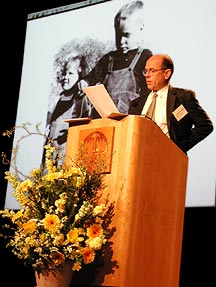Sharpless Addresses National Science Teachers Convention
By Jennifer O'Sullivan
Rahul Prabhakar is a ninth grader on spring break from Baldwin
Senior High School in Long Island. He accompanied his mother,
a biology instructor at Nassau Community College, to the National
Science Teachers Association (NSTA) annual conference at the
San Diego Convention Center. By the end of opening day March
27, Rahul had already filled one page of his notebook with
autographs, most notably that of general session keynote speaker
and Nobel laureate K. Barry Sharpless.
"[Dr. Sharpless] was preparing for his lecture, but I wanted
to at least meet him because I'm very interested in organic
chemistry," Prabhakar explains.
Sharpless, W. M. Keck Professor of Chemistry at The Scripps
Research Institute (TSRI), member of The Skaggs Institute
for Chemical Biology, and winner of the 2001 Nobel Prize in
Chemistry, is much sought after as a speaker these days. And
while clearly he can't accept each invitation that comes his
way, his appearance at the NSTA convention speaks to his strong
feelings on education.
"You're some of the most important people in science," Sharpless
told the crowd of over 1,000 science educators. "And I'm proud
to be asked to speak to you."
And speak he did. Dubbing his talk "Sensual Chemistry,"
Sharpless captivated the audience with his enthusiasm for
catalysis, chirality, and click chemistry. "Many organic molecules,
especially those produced by living systems, exist in two
forms that are mirror images of each other," Sharpless wrote
in the program abstract. "This subtle difference—'handedness,'
or absolute configuration—often results in very different
properties of the molecules, including smell and taste, two
of the five primal senses that sparked my fascination with
organic chemistry."
Peppered throughout Sharpless's address were tales and photographs
of his childhood—his first passions were fishing, photography,
and the illustrations in his father's medical journals—of
his family, and of his early scientific career. The personal
narrative of fishing expeditions off the Jersey shore with
his uncle provided a particularly vivid glimpse of a life
spent on myriad paths of discovery. Another highlight was
a photograph of Sharpless in action in a high school chemistry
class. "In those days things were done a bit more freestyle
than today," he joked.
Sharpless left teachers with many things to think about,
among them the idea that "thinking weird is not a bad thing
to do." He also gave them something he was sure they were
familiar with—homework—in the form of a reading
list that included James Adams' Conceptual Block Busting,
Kevin Kelly's Out of Control, James Gleick's Genius,
and the "Science Times" section of The New York Times,
appearing every Tuesday.
Judging from the response of several teachers interviewed
after the general session, Sharpless was a hit.
"I thought [K. Barry Sharpless] was phenomenal," said Diane
Warren, a teacher at Wichita Collegiate Upper School in Wichita,
Kansas. "I'm a chemistry teacher—an organic chemist—so
I was really interested in what he had to say about chirality
and click chemistry. I could have kept listening [for a long
time]..."
Integrative science teacher James Dickson, on break from
teaching at Millikan High School in Long Beach, also thoroughly
enjoyed the session.
"The whole idea that there are big applications of chemistry,
and that really they're all down to earth is great," Dickson
commented.
Founded in 1944 and headquartered in Arlington, Virginia,
the NSTA is committed to promoting excellence and innovation
in science teaching and learning. NSTA's current membership
of more than 53,000 includes science teachers, science supervisors,
administrators, scientists, business and industry representatives,
and others involved in and committed to science education.
In the words of NSTA President Harold Pratt, the conference,
which celebrates its 50th anniversary this year, "is the largest
science education conversation held on an annual basis." Hearing
the voice of K. Barry Sharpless in that conversation was certainly
a highlight for those in attendance.

|

TSRI's K. Barry Sharpless shares pictures
and stories from his childhood during the National Science
Teachers Association annual conference. One of his first great
passions, fishing, was quickly replaced by chemistry when
Sharpless learned about catalysis in
high school. Photo by Jason S. Bardi.
|

